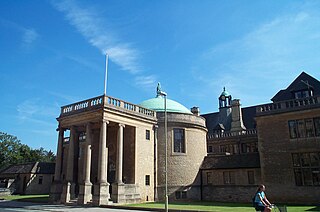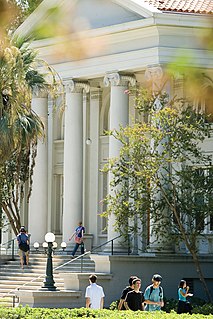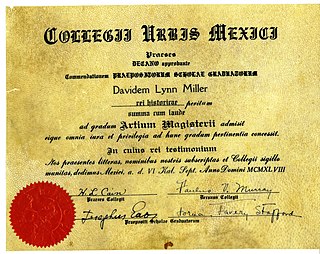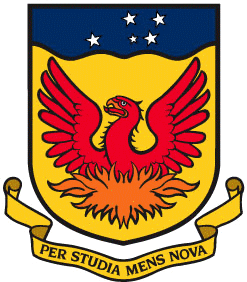Related Research Articles
A Master of Business Administration is a postgraduate degree focused on business administration. The core courses in an MBA program cover various areas of business administration such as accounting, applied statistics, human resources, business communication, business ethics, business law, strategic management, business strategy, finance, managerial economics, management, entrepreneurship, marketing, supply-chain management, and operations management in a manner most relevant to management analysis and strategy. It originated in the United States in the early 20th century when the country industrialized and companies sought scientific management.

A psychologist is a professional who practices psychology and studies mental states, perceptual, cognitive, emotional, and social processes and behavior. Their work often involves the experimentation, observation, and interpretation of how individuals relate to each other and to their environments.
Postgraduate education involves learning and studying for academic or professional degrees, academic or professional certificates, academic or professional diplomas, or other qualifications for which a first or bachelor's degree generally is required, and it is normally considered to be part of higher education. In North America, this level is typically referred to as graduate school.
A master's degree is an academic degree awarded by universities or colleges upon completion of a course of study demonstrating mastery or a high-order overview of a specific field of study or area of professional practice. A master's degree normally requires previous study at the bachelor's level, either as a separate degree or as part of an integrated course. Within the area studied, master's graduates are expected to possess advanced knowledge of a specialized body of theoretical and applied topics; high order skills in analysis, critical evaluation, or professional application; and the ability to solve complex problems and think rigorously and independently.

The Rhodes Scholarship is an international postgraduate award for students to study at the University of Oxford. Established in 1902, it is the oldest graduate scholarship in the world. It is considered among the most prestigious international scholarship programs in the world. Its founder, Cecil John Rhodes, wanted to promote unity between English-speaking nations and instill a sense of civic-minded leadership and moral fortitude in future leaders, irrespective of their chosen career paths. Initially restricted to male applicants from countries that are today within the Commonwealth, Germany and the United States, the scholarship is now open to applicants from all backgrounds and genders around the world. Since its creation, controversy has surrounded its initial exclusion of women, its historical failure to select black Africans, and Cecil Rhodes's own standing as a British imperialist.

Undergraduate education is education conducted after secondary education and before postgraduate education. It typically includes all postsecondary programs up to the level of a bachelor's degree. For example, in the United States, an entry-level university student is known as an undergraduate, while students of higher degrees are known as graduate students. Upon completion of a number of required and elective courses as part of an undergraduate program, the student would earn the corresponding degree. In some other educational systems, undergraduate education is postsecondary education up to the level of a master's degree; this is the case for some science courses in Britain and some medicine courses in Europe.

Tertiary education fees in Australia are payable for courses at tertiary education institutions. The Commonwealth government provides loans and subsidies to relieve the cost of tertiary education for some students. Some students are supported by the government and are required to pay only part of the cost of tuition, called the "student contribution", and the government pays the balance. Some government supported students can defer payment of their contribution as a HECS-HELP loan. Other domestic students are full fee-paying and do not receive direct government contribution to the cost of their education. Some domestic students in full fee courses can obtain a FEE-HELP loan from the Australian government up to a lifetime limit of $150,000 for medicine, dentistry and veterinary science programs and $104,440 for all other programs.

A graduate school is a school that awards advanced academic degrees with the general requirement that students must have earned a previous undergraduate (bachelor's) degree. A distinction is typically made between graduate schools and professional schools, which offer specialized advanced degrees in professional fields such as medicine, nursing, business, engineering, speech–language pathology, or law. The distinction between graduate schools and professional schools is not absolute since various professional schools offer graduate degrees and vice versa.

A diploma is a document awarded by an educational institution testifying the recipient has graduated by successfully completing their courses of studies. Historically, it has also referred to a charter or official document of diplomacy.

Doctor of Medicine is a medical degree, the meaning of which varies between different jurisdictions. In the United States, and some other countries, the M.D. denotes a professional. This generally arose because many in 18th-century medical professions trained in Scotland, which used the M.D. degree nomenclature. In England, however, Bachelor of Medicine, Bachelor of Surgery was used and eventually in the 19th century became the standard in Scotland too. Thus, in the United Kingdom, Ireland and other countries, the M.D. is a research doctorate, honorary doctorate or applied clinical degree restricted to those who already hold a professional degree (Bachelor's/Master's/Doctoral) in medicine; in those countries, the equivalent professional to the North American and some others use of M.D. is still typically titled Bachelor of Medicine, Bachelor of Surgery (M.B.B.S.).

The British undergraduate degree classification system is a grading structure for undergraduate degrees or bachelor's degrees and integrated master's degrees in the United Kingdom. The system has been applied in other countries and regions.

The University of Southern Queensland is a medium-sized, regional university based in Toowoomba, Queensland, Australia, with three university campuses at Toowoomba, Springfield and Ipswich. It offers courses in law, health, engineering, the sciences, business, education, and the arts. The institution was established in 1969 as the Darling Downs campus of the Queensland Institute of Technology. In 1970, the institution had provided studying programs for rural Queensland and international communities. In 1971, it became the Darling Downs Institute of Advanced Education, then the University College of Southern Queensland in 1990 and finally the University of Southern Queensland in 1992. It operates three research institutes and seven research centres which focus on a wide range of business, agricultural, scientific, environmental, and technological issues.
A postgraduate diploma is a postgraduate qualification awarded after a university degree, which supplements the original degree and awards them with a graduate diploma. Countries that award postgraduate diplomas include but are not limited to Bangladesh, Barbados, Belgium, Brazil, Canada, Chile, Colombia, Germany, Hong Kong, Jamaica, Spain, Kenya, South Africa, Sudan, India, Ireland, the Netherlands, New Zealand, Nigeria, Republic of Panama the Philippines, Portugal, Russia, Pakistan, Poland, Saudi Arabia, Singapore, Sweden, the United Kingdom, Sri Lanka, Trinidad and Tobago and Zimbabwe. Level of education and recognition differ per issuing country.

Free education is education funded through government spending or charitable organizations rather than tuition funding. Many models of free higher education have been proposed. Primary school and other comprehensive or compulsory education is free in many countries. Tertiary education is also free in certain countries, including post-graduate studies in the Nordic countries. The Article 13 of International Covenant on Economic, Social and Cultural Rights ensures the right to free education at primary education and progressive introduction of it at secondary and higher education as the right to education.

National Institute of Technology Kurukshetra is a public technical and research university located in Kurukshetra. In December 2008, it was accredited with the status of Institute of National Importance (INI). It is one of the 30 National Institutes of Technology established and administered by Government of India. It runs undergraduate and postgraduate in programme Engineering and Doctor of Philosophy programme in Engineering, Sciences and Humanities.
The Master of Philosophy is a postgraduate degree. In the United States, an MPhil typically includes a taught portion and a significant research portion, during which a thesis project is conducted under supervision. An MPhil may be awarded to postgraduate students after completing taught coursework and one to two years of original research, which may also serve as a provisional enrollment for a PhD programme.

Military Institute of Science and Technology (MIST) is a public engineering institute in Bangladesh located at Mirpur Cantonment, Dhaka. MIST is run by the Bangladesh Armed Forces, and is affiliated with Bangladesh University of Professionals. Though a military institution, both military and civilian students study in MIST.
The Endeavour Leadership Program, formerly Endeavour Scholarships and Fellowships, formerly Endeavour Awards, was an internationally competitive, merit-based scholarship programme that formed part of the Australian Government's $1.4 billion Australian initiative. The programme brought leading researchers, executives and students to Australia to undertake short or long term study, research and professional development in a broad range of disciplines, and enabled Australians to do the same abroad. It aimed at developing linkages between involved nations.

Dr Manmohan Singh Scholarships are available for any students for doctoral study at St John's College at the University of Cambridge and for undergraduate studies at the university. The Scholarships are named in honor of Manmohan Singh, a former Prime Minister of India and a renowned economist. Singh graduated from St John's College with a First in Economics in 1957, went on to earn a DPhil from the University of Oxford in 1962, and was awarded an honorary doctorate by the University of Cambridge in 2006.

A Doctor of Philosophy is the most common degree at the highest academic level awarded following a course of study. PhDs are awarded for programs across the whole breadth of academic fields. Because it is an earned research degree, those studying for a PhD are required to produce original research that expands the boundaries of knowledge, normally in the form of a dissertation, and defend their work before a panel of other experts in the field. The completion of a PhD is often a requirement for employment as a university professor, researcher, or scientist in many fields. Individuals who have earned a Doctor of Philosophy degree may, in many jurisdictions, use the title Doctor with their name, although the proper etiquette associated with this usage may also be subject to the professional ethics of their own scholarly field, culture, or society. Those who teach at universities or work in academic, educational, or research fields are usually addressed by this title "professionally and socially in a salutation or conversation." Alternatively, holders may use post-nominal letters such as "Ph.D.", "PhD", or "DPhil". It is, however, considered incorrect to use both the title and post-nominals at the same time.
References
- 1 2 "Australian Postgraduate Awards (APA)". Archived from the original on 13 April 2012. Retrieved 31 March 2012.
- ↑ "Australian Postgraduate Awards". Archived from the original on 7 July 2017. Retrieved 6 December 2017.